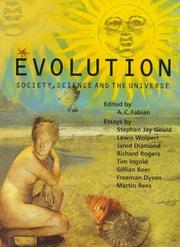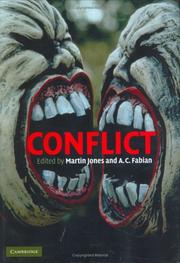| Listing 1 - 8 of 8 |
Sort by
|
Book
ISBN: 0511629044 Year: 1998 Publisher: Cambridge : Cambridge University Press,
Abstract | Keywords | Export | Availability | Bookmark
 Loading...
Loading...Choose an application
- Reference Manager
- EndNote
- RefWorks (Direct export to RefWorks)
Cutting across boundaries of art and science, evolution is a fundamental process that has beguiled thinkers through the ages. This collection draws together world-renowned thinkers and communicators with their own intriguing insights. In these essays they offer a feast of dazzling thoughts and ideas to challenge and enthral the reader. Why and how do civilizations and societies change over time? Why do our cells develop the way they do? Why are some villages still villages while others have grown into vast cities? Can we learn from our evolutionary past to plan a better future for our health and society? Tracing a line from the history of biological evolution, through the evolution of cultures, society, science and the universe, Evolution brings together intriguing parallels from all levels of life. From the evolution of the developing embryo to the evolution of a developing star, common threads develop into a fascinating story.

ISBN: 9780511629044 9780521572088 9780521032179 Year: 1998 Publisher: Cambridge Cambridge University Press
Abstract | Keywords | Export | Availability | Bookmark
 Loading...
Loading...Choose an application
- Reference Manager
- EndNote
- RefWorks (Direct export to RefWorks)

ISBN: 9780511541360 9780521839600 0511138024 9780511138027 0521839602 0511139349 9780511139345 0511139799 9780511139796 9780511140563 0511140568 0511541368 9786610422098 6610422095 0521839602 1107151104 1280422092 0511183402 0511311583 9781280422096 Year: 2006 Publisher: Cambridge New York Cambridge University Press
Abstract | Keywords | Export | Availability | Bookmark
 Loading...
Loading...Choose an application
- Reference Manager
- EndNote
- RefWorks (Direct export to RefWorks)
Conflict, sadly, is part of our everyday life; experienced at home, in the workplace, on our TV screens. But is it an inevitable part of the fabric of our existence? In this volume, eight experts examine conflict at many levels, from the workings of genes to the evolution of galaxies. Evolutionary biologist David Haig examines why we disagree with ourselves, and psychologist Simon Baron-Cohen asks whether differences between the average male and female mind must necessarily lead to misunderstanding. Anthropologist Richard Wrangham explores why chimpanzees and humans have evolved to kill, while archaeologist Barry Cunliffe examines the roots of warfare. Political scientist Lisa Anderson analyses conflict in the Middle East, and broadcaster Kate Adie reflects on television reporting of war. The book concludes with industrial economist William Brown's discussion of conflict in labour relations, and an exploration of the creative and destructive effects of cosmic violence by physicist P. C. W. Davies.
Conflict (Psychology) --- Violence. --- Social conflict. --- Class conflict --- Class struggle --- Conflict, Social --- Social tensions --- Interpersonal conflict --- Social psychology --- Sociology --- Violent behavior --- Intrapsychic conflict --- Adjustment (Psychology) --- Motivation (Psychology) --- Interpersonal relations. --- Human relations --- Interpersonal relationships --- Personal relations --- Relations, Interpersonal --- Relationships, Interpersonal --- Social behavior --- Object relations (Psychoanalysis)
Book
ISBN: 131609393X 1316094227 1139644335 1107612551 Year: 2014 Publisher: Cambridge : Cambridge University Press,
Abstract | Keywords | Export | Availability | Bookmark
 Loading...
Loading...Choose an application
- Reference Manager
- EndNote
- RefWorks (Direct export to RefWorks)
Life is a compelling addition to the Darwin College Lecture Series, in which eight distinguished authors each present an essay from their area of expertise devoted to the theme of 'life'. The book forges connections between art, science and the humanities in a vibrant and thought-provoking collection that exposes both conventional and unconventional views on the meaning of life, the enigmatic boundaries between the living and the dead, and what may or may not follow afterwards. This collection arises from the Darwin College Lecture Series of 2012 and includes contributions from eight distinguished scholars, all of whom are held in esteem not only for their research, but also for their ability to communicate their subject to popular audiences.
Life. --- Life --- Philosophy
Book
Year: 1987 Publisher: Sauverny Geneva observatory
Abstract | Keywords | Export | Availability | Bookmark
 Loading...
Loading...Choose an application
- Reference Manager
- EndNote
- RefWorks (Direct export to RefWorks)
Book
ISBN: 9781139644334 9781107612556 Year: 2014 Publisher: Cambridge Cambridge University Press
Abstract | Keywords | Export | Availability | Bookmark
 Loading...
Loading...Choose an application
- Reference Manager
- EndNote
- RefWorks (Direct export to RefWorks)
Book
ISBN: 9781108946339 9781108931021 Year: 2021 Publisher: Cambridge Cambridge University Press
Abstract | Keywords | Export | Availability | Bookmark
 Loading...
Loading...Choose an application
- Reference Manager
- EndNote
- RefWorks (Direct export to RefWorks)
Book
ISBN: 1108944264 1108950493 110894633X Year: 2021 Publisher: Cambridge : Cambridge University Press,
Abstract | Keywords | Export | Availability | Bookmark
 Loading...
Loading...Choose an application
- Reference Manager
- EndNote
- RefWorks (Direct export to RefWorks)
Arising from the 2019 Darwin College Lectures, this book presents essays from seven prominent public intellectuals on the theme of vision. Each author examines this theme through the lens of their own particular area of expertise, making for a lively interdisciplinary volume including chapters on neuroscience, colour perception, biological evolution, astronomy, the future of technology, computer vision, and the visionary core of science. Featuring contributions by professors of neuroscience Paul Fletcher and Anya Hurlbert, professor of zoology Dan-Eric Nilsson, the futurist Sophie Hackford, Microsoft distinguished scientist Andrew Blake, theoretical physicist and author Carlo Rovelli, and Dr Carolin Crawford, the Public Astronomer at the University of Cambridge, this volume will be of interest to anybody curious about how we see the world.
| Listing 1 - 8 of 8 |
Sort by
|

 Search
Search Feedback
Feedback About UniCat
About UniCat  Help
Help News
News